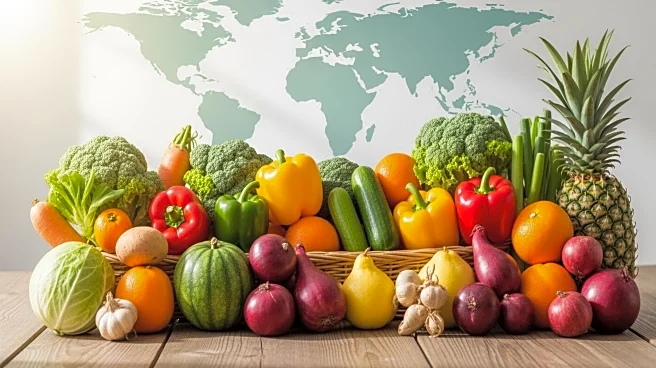What's Happening?
Senior government officials from over 20 countries participating in the Belt and Road Initiative (BRI) have committed to enhancing cooperation with China in agricultural trade and food safety. This collaboration aims to strengthen economic ties and build
resilient supply chains among partner economies. At a conference in Shanghai, ministers from countries such as South Africa, Turkiye, and Kazakhstan emphasized the importance of expanding cooperation in agricultural technology, standards harmonization, and market access. China's food trade with BRI partner countries reached 915.24 billion yuan ($128.45 billion) in the first three quarters of the year, marking a 2.5% increase year-on-year. South Africa's Minister of Agriculture, John Steenhuisen, highlighted the potential for trade growth and rural development through collaboration with China.
Why It's Important?
The expansion of agricultural trade under the BRI is significant for participating countries as it promises enhanced food security, employment generation, and sustainable development. By aligning standards and expanding market access, these economies can better withstand external shocks and create a stable agricultural trade system. The initiative also fosters deeper integration of supply chains, which is crucial for global economic stability. Countries like Cambodia are leveraging free trade agreements to boost cross-border investment and distribution of goods, highlighting the broader economic impact of the BRI. This cooperation is expected to attract investment in processing industries and create more employment opportunities, particularly in Africa.
What's Next?
The ongoing collaboration is likely to lead to increased agricultural productivity and investment in processing industries across Africa and other BRI partner nations. As countries continue to sign agreements on market access for agricultural products, the trade network is expected to expand further. The focus will be on aligning standards and expanding mutual market access to create a more inclusive agricultural trade system. Additionally, Chinese cities are emerging as vital hubs for the distribution of imported food products, indicating a growing demand for quality agricultural goods among Chinese consumers.
Beyond the Headlines
The BRI's focus on agricultural trade highlights the importance of food security and sustainable development in global economic strategies. By fostering cooperation in agricultural technology and standards harmonization, the initiative addresses critical challenges such as protectionism and supply chain disruptions. This approach not only strengthens economic ties but also promotes a shared commitment to improving living standards across partner economies.














